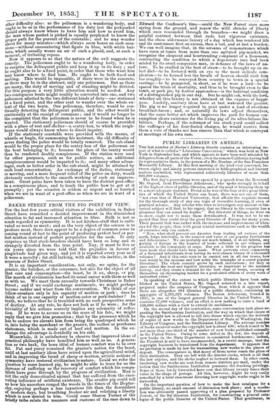BAKER STREET FROM THE PIG POINT OF VIEW. FOR the
last few years critical visitors of the exhibition in Baker Street have remarked a decided improvement in the diminished attention to fat and increased attention to fibre. Bulk is not so much regarded as symmetry. It is not kitchen-stuff that is culti- vated so much as meat; and as the very object of the science is to produce meat, there does appear to be a degree of common sense in coming round at last to the point of producing perfect beef or per- fect mutton instead of perfect perquisites for the cook. It only surprises us that stock-breeders should have been so long and so strangely diverted from the true point. Nay, it must be five or six years since we were told that the prejudice in favour of pinguitude had given way, and yet it is reported every year as if it were a novelty ; fat still lurking, with all the via inertia, in the museum of Baker Street.
It is an important consideration, not only, we opine, for the grazier, the butcher, or the consumer, but also for the object of all that care and consumption—the beast, be it ox, sheep, or pig. The march of civilization has had its usual career with them as well as with us. We meet them annually towards Christmas in Baker Street ; and if we could exchange sentiments, we might perhaps become sadder and wiser from the conversation. We think of our fellow-creature only in his capacity of mutton or pork : does he think of us in our capacity of mutton-eater or pork-butcher ? In truth, we believe that he is troubled with no such prospective sense of destiny. At any rate, he does not look as if be were ; for the triviality of his actions scarcely implies any solemnity of reflec- tion. If he were to accuse us on the score of his fate, we might reply that we give him promotion ; that by the processes which he has to endure we elevate him from being the quadruped which he is, into being the merchant or the grazier, the author or perchance statesman, which is made out of beef and mutton. In the ex- change the advantage is decidedly on his side.
Meanwhile, it is satisfactory to observe that improved ideas of practical philosophy have benefited him as well as us. A genera- tion or two back, the beau ideal of human comfort was to be over fat. Fat and pursy remained the grazier's notion for the beast, until at last sanitary ideas have seized upon the agricultural mind, and in improving the breed of sheep or mutton, artistic notions of symmetry have restored civilization to nature. Could we refer the 9nestion to some learned pig, he might be able to trace for us the ni.crease of suffering or the recovery of comfort which his compa- triots have gone through by the progress of civilization. Man is not the only domesticated animal that has suffered from the ener- vating influence of artificial existence. The erudite pig could tell us how his ancestors ranged the woods in the times of the Heptar- chy, enjoying perhaps a less luxurious life than the descendant of modern days, but breathing fresher air and relishing a liberty which is now denied to him. Could some Sharon Turner of the bristly tribe relate the manners and customs of the race down to Edward the Confessor's time—could the New Forest once more spring from the ground, and renew the wild shrieks of liberty which once resounded through its branches—we might draw a painful contrast between that rude but vigorous existence, and the obese aldermanic luxury of a day which has rendered life and its sustenance first an excess, then a toil, and at last a burden. We can well imagine that, in the screams of remonstrance which have risen at times from more than one agitated pig-market, we recognize the eloquent and heartrending complaint of a ltousseau, contrasting the condition to which a degenerate race had been misled by its cruel companion man, in defiance of the laws of na- ture. To be cradled in the best of straw—to be brought up on se- lect diet—to be fostered with an eye to the most delicate com- plexion—to be housed lest the breath of heaven should visit him too roughly—to be conveyed from country to town in a special carriage—to be pampered, in short, as if he were a lord—to be spared the trials of mortality, and thus to be brought even to the tomb, or pork pie, by festive approaches—is the habitual condition of a distinguished pig in our day. But he might ask, with the lord, whether all this luxury is net obtained at the expense of happi- ness. Luckily, sanitary ideas have at last wakened the grazier. The pig is no longer required to pant under a load of overdone breakfast-bacon ; and, so naturally do laws adjust themselves, that the same better art which improves the pork for human con- sumption clears existence for the living pig of its ultra-bilious lia- bilities. Perhaps, if the reformer of toe stock-yard could collect the suffrages of his four-footed charges, he would receive from them a vote of thanks not less sincere than that which is conveyed at meetings of his own race.


































 Previous page
Previous page